Top 5 Essential Oils For Infection
Unlock the power of nature’s own antibacterial agents with the best essential oils for infection! These natural wonders not only help combat infections but also provide numerous additional benefits, elevating overall well-being.
Key Points
- Unlock nature’s antibacterial power with the top 5 essential oils for infection.
- Enjoy therapeutic benefits from inhalation and topical application of diluted essential oils.
- Aromatherapy can help improve mood, reduce stress levels, and combat drug-resistant bacteria safely.
The Top 5 Essential Oils for Infection
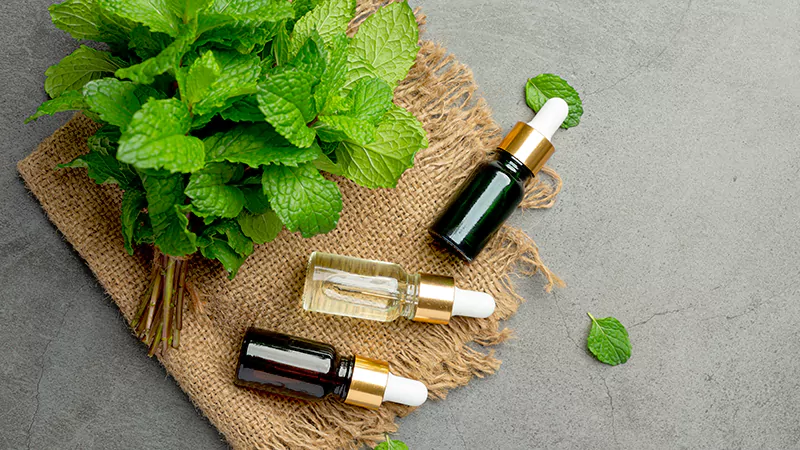
Nature has gifted us with myriad essential oils, each possessing unique properties to help fight infections. We have compiled a list of the top 7 antibacterial essential oils renowned for their powerful antibacterial properties, which may provide an effective alternative or complementary treatment to traditional antibiotics.
These essential oils include tea tree oil, lemongrass oil, eucalyptus oil, oregano oil, cinnamon oil, thyme essential oil, peppermint oil, ginger essential oil, and other essential oils.
Each of these oils has demonstrated remarkable abilities to combat bacterial infections by targeting bacterial cell walls, making them a natural choice in the fight against harmful microorganisms.
Tea Tree Oil
Tea tree oil is an incredibly versatile essential oil with impressive antibacterial properties. It has been widely used to treat various skin infections, and it can also be employed as a powerful household disinfectant. When used topically, it can effectively combat bacteria, fungi, and viruses, making it a go-to oil for various health concerns.
For topical use, mix one teaspoon of Manuka honey and/or coconut oil with a few drops of tea tree oil and apply it to the affected area, especially for skin infections. As a household disinfectant, add three drops of tea tree essential oil to a spray bottle filled with equal parts white vinegar and water. This natural disinfectant will leave your home clean and smelling fresh without the harsh chemicals present in many store-bought products.
Lemongrass Oil
Lemongrass oil is an aromatic powerhouse effective against various bacteria, including Staphylococcus aureus, Bacillus cereus, and Bacillus subtilis. This essential oil not only combats drug-resistant bacteria but also serves as a natural air freshener and relaxation aid.
To enjoy the topical benefits of lemongrass oil, follow these steps:
- Dilute it with a carrier oil such as coconut or olive oil.
- Mix 12 drops of lemongrass oil with one teaspoon of carrier oil.
- Massage the mixture onto the skin or add it to bathwater for a luxurious, therapeutic experience.
Inhaling the invigorating aroma of lemongrass oil and lavender oil can help promote a sense of calmness and well-being.
Eucalyptus Oil
Eucalyptus oil is known for its powerful antimicrobial properties, making it a potential natural antibiotic. It exhibits strong bactericidal activity against various bacteria, including:
- E. coli
- S. aureus
- P. aeruginosa
- MRSA
However, remember that eucalyptus oil should never be ingested.
To reap the benefits of eucalyptus oil, consider adding it to a diffuser or a warm, relaxing bath. Its soothing scent can help clear airways, relieve congestion, and provide an overall calming effect, making it a popular choice for treating respiratory issues and promoting relaxation.
Oregano Oil
Oregano oil is a potent antibacterial and antiviral essential oil, effective against a myriad of infections. It owes its extraordinary power to compounds such as carvacrol, thymol, and rosmarinic acid. Not only is oregano oil highly effective in combating bacterial infections, but it has also shown promising results against antibiotic-resistant strains.
Whether applied topically or consumed, oregano oil can provide a natural and effective way to treat infections. This versatile oil is an excellent addition to any natural remedy arsenal, offering a potent alternative to traditional antibiotics.
Cinnamon Oil
Cinnamon essential oil is another essential oil with impressive antibacterial properties. It has been shown to inhibit the growth of bacteria such as E. coli, S. aureus, and P. aeruginosa, making it a valuable weapon in the fight against bacterial infections.
A study published in the Journal of Contemporary Dental Practice found that cinnamon oil was effective against planktonic E. faecalis present in root canal procedures, making it a compatible natural option. This powerful essential oil has the potential to become a vital component in infection treatment, particularly against antibiotic-resistant strains. Below are 2 bonus oils that are also effective for infections.
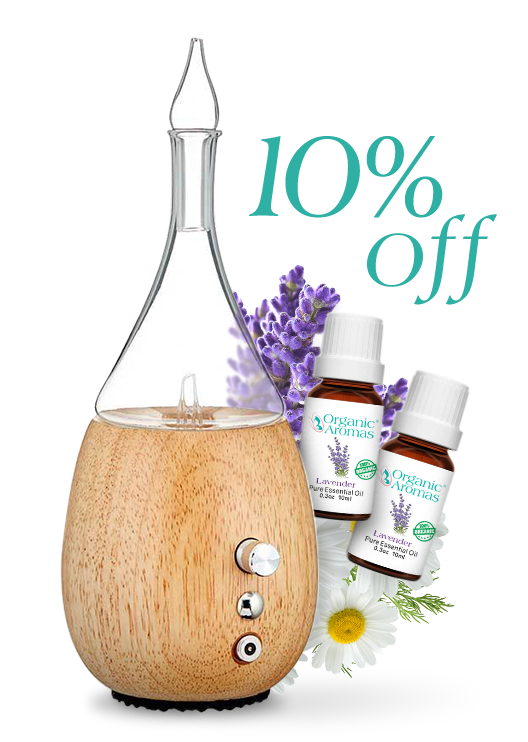
Join Now and Get a Coupon for 10% Off!
Thyme Essential Oil
Thyme essential oil is a powerful antibacterial and antifungal agent, safe for topical use without causing skin irritation. Its remarkable properties make it an excellent choice for combating various skin infections and promoting overall skin health.
Studies at the University of Tennessee’s Department of Food Science and Technology have shown promising results for the use of thyme oil against bacteria found in milk and salmonella. These findings suggest that “nanoemulsions” of thyme oil could be fantastic options for protecting our bodies from bacteria by using thyme oil as an antimicrobial preservative for food.
Peppermint Oil
Peppermint oil has several benefits, including:
- Acting as a powerful antibiotic against multiple resistant bacteria strains
- Helping to cure several types of fungal infection
- Providing a refreshing scent and cooling sensation
Because of these benefits, peppermint oil is a popular choice for various applications, from skincare to household cleaning.
The main active components of peppermint oil, such as:
- menthol
- menthone
- menthofuran
- menthyl acetate
contribute to its remarkable antibacterial and antifungal properties. Whether used topically or inhaled, peppermint oil offers a multitude of benefits that can enhance overall well-being.

How to Use Essential Oils for Infection
Incorporating essential oils into your infection-fighting routine can be done in various ways, including inhalation, topical application, and proper dilution with carrier oils. Each method offers unique benefits, allowing you to tailor your approach to your specific needs and preferences.
Whether you’re looking to treat respiratory infections, target specific areas of infection, or reduce the risk of skin irritation, knowing how to use essential oils effectively is key to achieving the best results and promoting overall well-being.
Inhalation
Inhaling essential oils can provide numerous benefits, particularly for respiratory infections. Many essential oils, such as eucalyptus, peppermint, and tea tree oil, possess anti-inflammatory properties that can help reduce swelling and edema associated with respiratory infections. These oils can also help alleviate symptoms like congestion and difficulty breathing by clearing the airways and removing mucus.
Steam inhalation is the recommended method for inhaling essential oils for infection relief. Simply add three to seven drops of essential oil to boiling water in a large pot or heatproof bowl and enjoy the therapeutic steam. This approach allows the beneficial properties of the oils to be inhaled and absorbed into the respiratory system, providing relief from symptoms and supporting the body’s natural healing process.
Topical Application
Topical application of essential oils allows you to target specific areas of infection. However, remember to properly dilute the oils with a carrier oil, such as olive oil or coconut oil, to avoid skin irritation. Mix 2 to 3 drops of the essential oil with 20 drops of a carrier oil and apply the mixture to the affected area using a clean and disposable material, like sterile cotton gauze, for optimal results.
Proper dilution not only guarantees the safe and effective use of essential oils but also aids in delivering the beneficial compounds directly to the skin, providing relief from symptoms and promoting healing.
Dilution and Carrier Oils
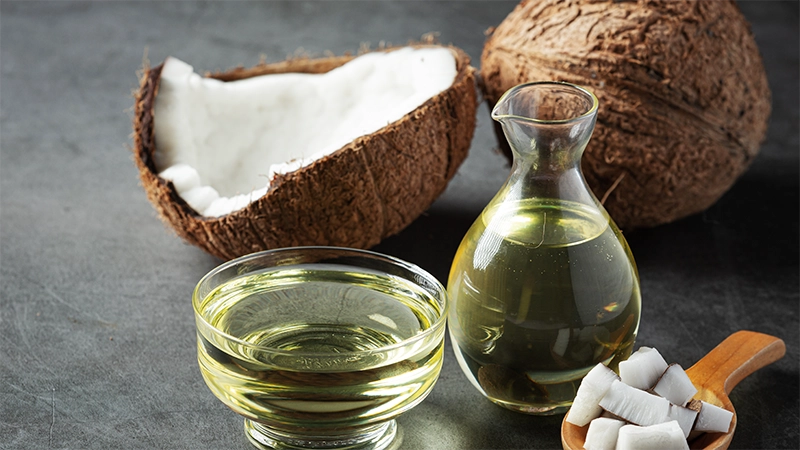
Diluting essential oils with carrier oils ensures safe and effective use, reducing the risk of skin irritation or allergic reactions. Some excellent choices for carrier oils when diluting essential oils for infection treatment are:
- Coconut oil
- Olive oil
- Almond oil
- Jojoba oil
- Argan oil
- Grapeseed oil
- Avocado oil
A general guideline for most topical applications is a dilution ratio of 1-2% or 1-2 drops of essential oil per teaspoon of carrier oil. In acute situations or small areas of concern, a higher dilution ratio of up to 10% may be used. It is recommended to consult a qualified aromatherapist or reference a reputable source for specific recommendations for the best results.
Risks and Precautions
While essential oils offer numerous benefits and can be used safely with the right education and consultation with a healthcare professional, it is important to be aware of the potential risks and precautions associated with their use. Some essential oils can cause skin irritation if not properly diluted or used in excess, and allergic reactions are possible.
Before using essential oils to treat infections or other health concerns, it is recommended to consult a healthcare professional.
Skin Irritation

Some essential oils can cause skin irritation if not properly diluted or used in excess. To avoid skin irritation, remember to dilute essential oils with a carrier oil before applying them to the skin. A general guideline for most topical applications is a dilution ratio of 1-2% or 1-2 drops of essential oil per teaspoon of carrier oil.
If you experience skin irritation from an essential oil, follow these steps:
- Wash the affected area well with mild soap and water.
- Apply a carrier oil to soothe the skin.
- If the irritation persists or worsens, discontinue the use of the essential oil.
- Consult a healthcare professional if needed.
Allergic Reactions
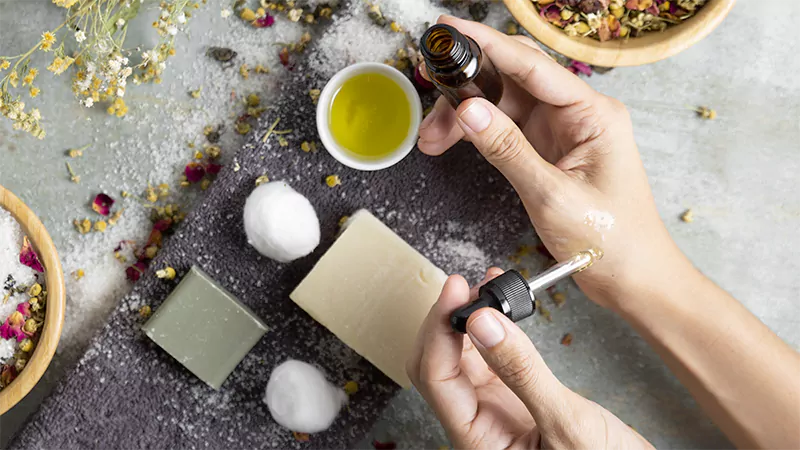
Allergic reactions to essential oils are possible, making it important to perform a patch test before using them extensively. To do a skin patch test, follow these steps:
- Dilute the essential oil with a carrier oil.
- Apply a small amount to your inner elbow or back.
- Leave it on for 24 hours without washing or covering the area.
- Observe for any signs of irritation, redness, itching, or swelling.
If there is no reaction, the essential oil is likely safe for use. However, if there is a reaction, avoid using that particular essential oil and consult a healthcare professional for further guidance.
Consultation with a Healthcare Professional
Before using essential oils to treat infections or other health concerns, it is recommended to consult a healthcare professional. They can offer invaluable advice on proper usage and help identify any potential risks or allergies. It is also important to consult a healthcare professional if you have any questions, if you are using essential oils on children, or if you are experiencing persistent pain that doesn’t improve within a few days.
Consulting a healthcare professional can guarantee the safe and effective use of essential oils, which allows for their maximum potential to be utilized in promoting overall well-being and treating various health concerns.

Join Our Exclusive Member Club to get Big Discounts!
Combating Drug-Resistant Bacteria with Essential Oils
Essential oils offer a promising alternative to traditional antibiotics in the fight against drug-resistant bacteria. Their powerful antibacterial properties have been shown to effectively combat various bacterial strains, including those resistant to conventional antibiotics.
Incorporating essential oils into your infection-fighting routine enables you to use the power of nature to combat harmful bacteria, while minimizing the risks associated with overusing traditional antibiotics. This natural approach to infection treatment not only protects your body but also supports the development of a healthier and more sustainable healthcare system.
Aromatherapy and Additional Benefits of Essential Oils
Beyond their antibacterial properties, essential oils offer numerous benefits through aromatherapy. The practice of using essential oils for therapeutic purposes can help:
- Improve mood
- Promote relaxation
- Reduce stress levels
- Enhance cognition
- Decrease agitation
- Lessen anxiety
Some popular essential oils for aromatherapy include:
- Lavender
- Chamomile
- Ylang-ylang
- Lemon
- Bergamot
By incorporating these scents into your daily routine, you can not only combat infections but also enhance your overall well-being and emotional health.
Finally..
Essential oils offer a powerful and natural way to combat infections while providing numerous additional benefits for overall well-being. By understanding the top essential oils for infection, learning how to use them effectively, and being aware of the risks and precautions associated with their use, you can harness the power of nature to promote a healthier and more vibrant life.
Frequently Asked Questions
What essential oil draws out infection?
These essential oils have been scientifically proven to draw out infections, such as candida and E. Coli, making them a powerful weapon against bacterial infections.
Which essential oil is the most antibacterial?
Eucalyptus essential oil is the most antibacterial, offering protection against even some drug-resistant bacteria.
What is the most powerful natural antibiotic?
Nature has provided us with powerful natural antibiotics like garlic, honey, and ginger, allowing us to fight infection without using synthetic drugs.
Are essential oils better than antibiotics?
Overall, laboratory studies suggest that certain essential oils can be as effective or more effective than antibiotics. However, results from clinical trials are not definitive and need further study.
How do I properly dilute essential oils for topical application?
Mixing essential oils with a carrier oil before applying to the skin is the best way to safely dilute them for topical application – just 1-2 drops of oil with a teaspoon of carrier oil should do the trick!

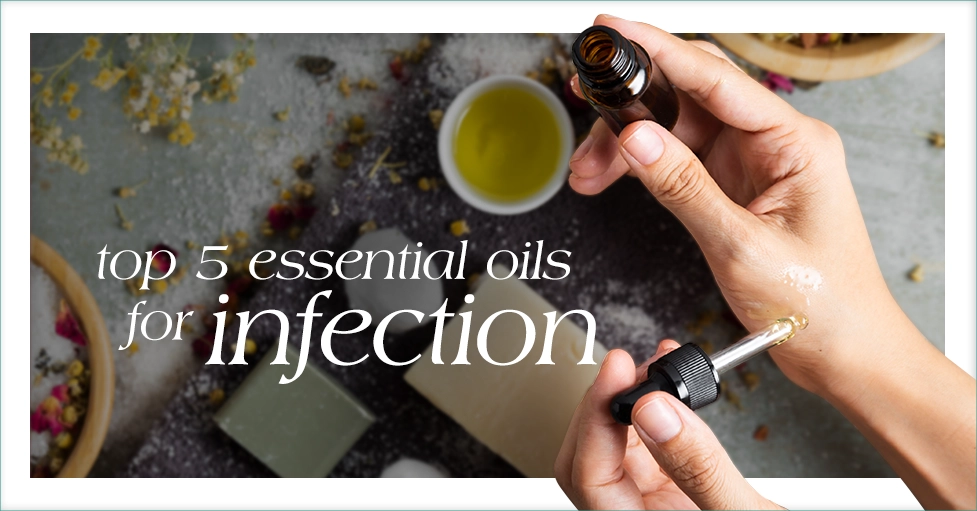


So great to know! Thanks for sharing.
Really helpful to know.
This is such a useful post. I love Cinnamon essential oil so I really love knowing about this! I pinned it.
This article was very interesting. I’m going to give oils a try. I hate taking medicine. I would rather go the natural route
Such useful information. Imma have to put it to the test.
This is perfect timing! I just started using a neti pot for my sinus issues from a cold that’s been hanging on for a month. My doc recommended adding oregano oil to the solution but now I’m going to put in a bit of tea tree oil too! 🙂
I’m in healthcare and deal with a lot of harsh chemicals so I love having natural options for antiseptics at home. Thanks!
I never thought about using oils to beat infections. I knew tea tree was good for a lot things abut the other no ideal
Natural oils is the only way to go and I agree that Tree tea can stop, heal, and/or cure many health problems faster than a antibiotic
Great article full of beneficial information
good to know. thanks for the info
Great info. Thanks
Thank you so much for awesome information!
I love the Thyme essential oil the best; I could really use it!
Tea tree oil has so many health benefits.
I love Tea Tree oil for skin problems and infections but I wasn’t aware of the other oils cinnamon etc that also helped! I would much rather try essential oils than antibiotics with all of their side effects and resistance build-ups as well. Thank You!!
Great info… They’re also good for smelly teenagers.
Wow, I was only aware of the benefits of tea tree oil!!! I will definitely be adding the other 4 oils-cinnamon, thyme, grapefruit & clove to my essential oils for natural health care. Thanks so much for the great info! 🤗
We have been using Tea Tree Oil for infections, cuts, bruises, bites, and so much more for over 20 years! It’s the first oil we grab.
Essential oils have so many healthy benefits and this is ear infection season! I am guessing you could mix oils if you wish? I want to incorporate this in the virus battle we fight every season. Great advice & information thank you!
Thank you so much for sharing this! Just another one of the many benefits of essential oils! My favorite recipe with essential oils is Thieve’s Oil blend, and it uses a lot of clove and cinnamon! Anything is better than getting sick!
I need some here for sure
I wasn’t aware that there are antibacterial benefits in essential oils.
I have been using natural remedies for 44 years. I hate the fact that Big Pharma tries to duplicate nature. I love the oils!!!
great info. i love using oils
So interesting and great to know!
Thanks for these useful natural tips. I am always looking for natural solutions
This is such an important review!! Some of the antibiotics are becoming immune to some of these infections! I have to admit that I would have loved to of have some of these oils when I was going through my sterilization time after my stem cell transplant!! I know about cloves & cinnamon for a while now. Cinnamon also helps with lowering my sugars! I had to pin and tweet this article! You never know the life you might save might just be your own or your loved ones ❤️ Thank you for sharing!
This is such useful information.
This is amazing to find out I take a lot off skin infections
Really great, it heals a lot of problems! 🙂
Clove oil too, I swear it
Good to know, there has been cases of MRSA at our local hospital.
I’m always interested in more natural ways to help the body. Thanks for the ideas!
I am always willing to learn about essential oils! Thank you for sharing this!
Good to know with cold and flu season coming up.
I love these essential oils:
Thyme essential oil
Grapefruit essential oils
Clove essential oil
Cinnamon essential oil
Tea tree essential oil
Interesting information
It’s a good read, very helpful and informative. Thanks Organic Aromas!😊💕
very interesting read
Great informative article
fantastic article
Great article. Definitely going to come in handy for many people.
I love hone remedies! Cinnamon is one powerhouse essential oil! Excellent benefits!
just in time for cold and flu season
very informative thank you
such good information I had no Idea thank you
wow so much great info thanks
So great to learn!